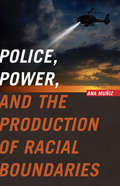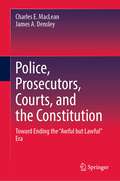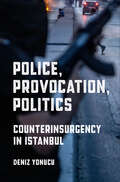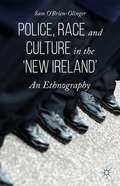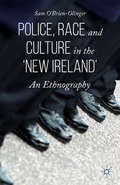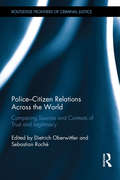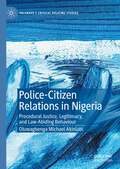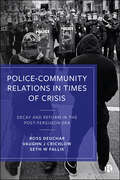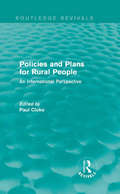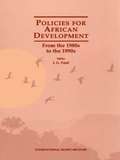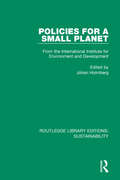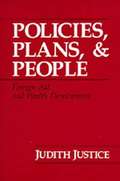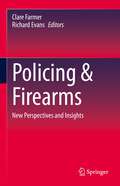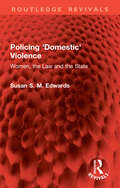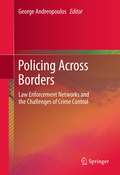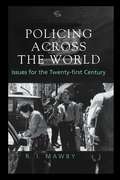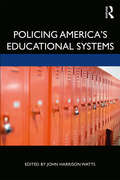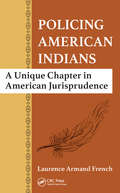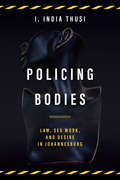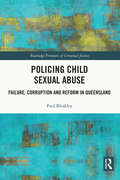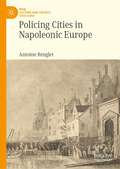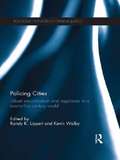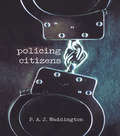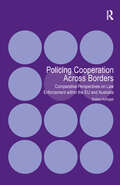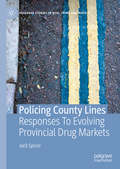- Table View
- List View
Police, Power, and the Production of Racial Boundaries
by Ana MuñizBased on five years of ethnography, archival research, census data analysis, and interviews, Police, Power, and the Production of Racial Boundaries reveals how the LAPD, city prosecutors, and business owners struggled to control who should be considered "dangerous" and how they should be policed in Los Angeles. Sociologist Ana Muñiz shows how these influential groups used policies and everyday procedures to criminalize behaviors commonly associated with blacks and Latinos and to promote an exceedingly aggressive form of policing. Muñiz illuminates the degree to which the definitions of "gangs" and "deviants" are politically constructed labels born of public policy and court decisions, offering an innovative look at the process of criminalization and underscoring the ways in which a politically powerful coalition can define deviant behavior. As she does so, Muñiz also highlights the various grassroots challenges to such policies and the efforts to call attention to their racist effects. Muñiz describes the fight over two very different methods of policing: community policing (in which the police and the community work together) and the "broken windows" or "zero tolerance" approach (which aggressively polices minor infractions--such as loitering--to deter more serious crime). Police, Power, and the Production of Racial Boundaries also explores the history of the area to explain how Cadillac-Corning became viewed by outsiders as a "violent neighborhood" and how the city's first gang injunction--a restraining order aimed at alleged gang members--solidified this negative image. As a result, Muñiz shows, Cadillac-Corning and other sections became a test site for repressive practices that eventually spread to the rest of the city.
Police, Prosecutors, Courts, and the Constitution: Toward Ending the “Awful but Lawful” Era
by James A. Densley Charles E. MacLeanThis book delves into a multitude of practices that, although deemed “lawful” by courts, are undeniably “awful” and unethical. From police officers employing deceit to extract confessions or consent to search, to prosecutors manipulating innocent individuals to relinquish their rights and plead guilty, to excessive force by law enforcement, these practices erode public trust in the criminal legal system and deny justice to those affected.With a critical examination of these deeply flawed tactics, this volume goes beneath the surface to explore their profound impact on the ethical standards and emotional health of justice system practitioners. It forcefully argues for a reclaiming of The Social Contract and for peace officers and prosecutors to unequivocally reject these unethical methods and recognize the urgent need for a criminal justice system that truly embodies ethics and fairness. This work equips police officers, prosecutors, judges, and legislators with invaluable research, enabling them to actively advocate for a transformed system that ethically serves justice for all in the post-George Floyd era.
Police, Provocation, Politics: Counterinsurgency in Istanbul (Police/Worlds: Studies in Security, Crime, and Governance)
by Deniz YonucuIn Police, Provocation, Politics, Deniz Yonucu presents a counterintuitive analysis of contemporary policing practices, focusing particular attention on the incitement of counterviolence, perpetual conflict, and ethnosectarian discord by the state security apparatus. Situating Turkish policing within a global context and combining archival work and oral history narratives with ethnographic research, Yonucu demonstrates how counterinsurgency strategies from the Cold War and decolonial eras continue to inform contemporary urban policing in Istanbul. Shedding light on counterinsurgency's affect-and-emotion-generating divisive techniques and urban dimensions, Yonucu shows how counterinsurgent policing strategies work to intervene in the organization of political dissent in a way that both counters existing alignments among dissident populations and prevents emergent ones. Yonucu suggests that in the places where racialized and dissident populations live, provocations of counterviolence and conflict by state security agents as well as their containment of both cannot be considered disruptions of social order. Instead, they can only be conceptualized as forms of governance and policing designed to manage actual or potential rebellious populations.
Police, Race and Culture in the 'New Ireland': An Ethnography
by Sam O'Brien-OlingerPolice, Race and Culture in the 'New Ireland'.
Police, Race and Culture in the 'new Ireland': An Ethnography
by Sam O'Brien-OlingerThis book explores the relationship between the Irish police and ethnic minorities, made particularly pressing by the rapid ethnic diversification of Irish society. It addresses the current deficit in knowledge of this area by exploring how Irish police officers conceive of, talk about, and interact with Ireland's immigrant minority communities.
Police-Citizen Relations Across the World: Comparing sources and contexts of trust and legitimacy (Routledge Frontiers of Criminal Justice)
by Sebastian Roché Dietrich OberwittlerPolice-citizen relations are in the public spotlight following outbursts of anger and violence. Such clashes often happen as a response to fatal police shootings, racial or ethnic discrimination, or the mishandling of mass protests. But even in such cases, citizens’ assessment of the police differs considerably across social groups. This raises the question of the sources and impediments of citizens’ trust and support for police. Why are police-citizen relations much better in some countries than in others? Are police-minority relations doomed to be strained? And which police practices and policing policies generate trust and legitimacy? Research on police legitimacy has been centred on US experiences, and relied on procedural justice as the main theoretical approach. This book questions whether this approach is suitable and sufficient to understand public attitudes towards the police across different countries and regions of the world. This volume shows that the impact of macro-level conditions, of societal cleavages, and of state and political institutions on police-citizen relations has too often been neglected in contemporary research. Building on empirical studies from around the world as well as cross-national comparisons, this volume considerably expands current perspectives on the sources of police legitimacy and citizens’ trust in the police. Combining the analysis of micro-level interactions with a perspective on the contextual framework and varying national conditions, the contributions to this book illustrate the strength of a broadened perspective and lead us to ask how specific national frameworks shape the experiences of policing.
Police-Citizen Relations in Nigeria: Procedural Justice, Legitimacy, and Law-Abiding Behaviour (Palgrave's Critical Policing Studies)
by Oluwagbenga Michael AkinlabiThis book offers an historical and contemporary analysis of policing and police-citizen relations in Nigeria, to understand why people co-operate (or don’t) with the police. It examines police legitimacy and the validity of procedural justice theory in a post-colonial African context where corruption, brutality and lack of accountability are not uncommon, to find more refined and alternative answers to the question of why people co-operate (or don’t) with the police. The history of policing in Nigeria is explored first and then procedural justice theory is tested through an extensive, cross-sectional survey of the public. One of the core findings is that citizens’ co-operation with the police is driven less by legitimacy but more by effectiveness considerations and “dull compulsion”, a concept akin to legal cynicism. This study represents one of the first attempts to test and understand “dull compulsion” and its relevance in this context. Overall, it develops the field by illustrating that that there are significant variations between contexts when addressing the influence of perceived procedural justice policing on perceptions of police legitimacy, and it explains the implications for policy makers.
Police–Community Relations in Times of Crisis: Decay and Reform in the Post-Ferguson Era
by Ross Deuchar Vaughn CrichlowThe death of Michael Brown at the hands of a white Ferguson police officer has uncovered an apparent legitimacy crisis at the heart of American policing. Some have claimed that de-policing may have led officers to become less proactive. How exactly has the policing of gangs and violence changed in the post-Ferguson era? This book explores this question, drawing on participant observation field notes and in-depth interviews with officers, offenders, practitioners, and community members in a Southern American state. As demands for police reform have once again come into focus following George Floyd’s death, this crucial book informs future policing practice to promote effective crime prevention and gain public trust.
Policies and Plans for Rural People: An International Perspective (Routledge Revivals)
by Paul ClokeThis edited collection, first published in 1988, was the first title to bring international perspectives into the field of rural planning. Using a comparative approach and a broad range of case studies, including Britain, Scandinavia, the U.S.S.R. and New Zealand, the authors review the major problems faced within rural areas, and policy responses to these problems. Each study deals with the political and institutional frameworks involved in the management of rural areas and the means by which policies have been implemented. With an introduction from Paul Cloke that places rural policies and plans within the context of the state, this reissue will be of great value to any students with an interest in the planning and organisation of rural communities across the world.
Policies for a Small Planet: From the International Institute for Environment and Development (Routledge Library Editions: Sustainability #4)
by Johan HolmbergFirst published in 1992. The world is not living within its means. Current development policies, in both industrial and developing countries, are wasting resources and destroying the commons on which we all depend. The world is set on a path of deepening poverty and a deteriorating environment. New policies are needed to achieve sustainable development. This book presents an integrated series of essays on the policies for sustainable development from one of the leading policy research institutes on environment and development issues. It concentrates on the developing world and looks at the specific sectors to which the policies have to be applied. Beginning with a discussion of what constitutes sustainable development, it goes on to deal with the institutional arrangements needed to mobilise human resources for change and the economic policies for sustainable natural resource management. It then examines the policies needed in agriculture, urban development, industry, forests, drylands, energy use, finance, population and consumption. Throughout it demonstrates how those directly involved are best placed to manage their environments and resources. Policies must support the experience and resourcefulness of local people. Sustainable development requires that they control their own futures. This title will be of great interest to students of Environmental Studies.
Policies, Plans, and People: Foreign Aid and Health Development
by Judith JusticeJudith Justice uses an interdisciplinary approach to show how anthropologists and planners can combine their expertise to make health care programs culturally compatible with the populations they serve.
Policing & Firearms: New Perspectives and Insights
by Richard Evans Clare FarmerPolicing and firearms: it is a crucial relationship. Should police be routinely armed? If so, what restrictions should be imposed on the use of firearms? Where police are not routinely armed, there is still a need for specialist armed police: how do these units operate, and are they effective?This ground-breaking edited book explores the nexus between policing and firearms with a genuinely international focus. Contributors from Ireland, Germany, the United Kingdom, Brazil, Mexico, the United States, Venezuela, New Zealand, Australia, and Canada explore the issues from a range of perspectives, including human rights, militarization, police legitimacy, and the risks police firearms pose to the community and to police themselves.This thought-provoking collection is an indispensable resource for law enforcement policymakers and students of policing and criminal justice.
Policing 'Domestic' Violence: Women, the Law and the State (Routledge Revivals)
by Susan S. EdwardsViolence in the home, particularly assault by a man on his wife or girlfriend, is an everyday phenomenon. What should the police and law courts do about it? In Policing ‘Domestic’ Violence, first published in 1989, reissued here with a new preface, Susan Edwards draws upon her extensive research into their actual responses, both before and after recent initiatives towards reform at the time, to address the practical and theoretical issues for criminology and feminism.Examining police and court practice, the author exposes the ways in which the patriarchal ideology enshrined in the law, and the masculine ethos of the police and legal profession, ensure that women receive less justice and less protection. She documents in detail the processes by which crimes against women are trivialized.The book combines a review of international research with the author’s own five-year exploration of policing in the UK through interviews with officers, observation and a review of record-keeping practice. It covers the introduction of new policing policies and offers a preliminary assessment of their success together with practical proposals for the future.At a theoretical level, this title addresses the key problems of criminality and punishment. Is it possible to reconcile the feminist critique of the marginalization of so-called domestic violence with the radical critique of the punitive system as oppressive and counterproductive? Does the protection of women justify infringement of family privacy?The book should be read in its historical context by students of criminology, law, women’s studies and sociology, as well as those concerned with policies and practical measures for dealing with violence in the home.
Policing Across Borders
by George AndreopoulosGlobalization has had a sharp impact on the definition of 'national security,' as the interconnectedness of many threats calls for them to be addressed at the national and global level simultaneously. Law enforcement efforts must increasingly include elements of international and transnational communication and cooperation. Police forces in different countries must find common ways to share data and track international crime trends. This timely work analyzes key challenges confronting the law enforcement community, with regards to international crime, particularly illegal trafficking and terrorism. The contributions in this volume are the result of a series of workshops that brought together international law enforcement officials, researchers, and representatives from intergovernmental organizations (IGOs) and non-governmental organizations (NGOs), to examine the need for international police cooperation, the specific challenges this presents, and to propose solutions. This work will be of interest to researchers in law enforcement, criminal justice, crime prevention, and international relations.
Policing Across the World: Issues for the Twenty-First Century
by R. I. MawbyThis wide-ranging text provides an overview of policing across different societies, and considers the issues facing the US and British police in a wider international context. The book is designed as a coherent introduction to the police.
Policing America's Educational Systems
by John Harrison WattsPolicing America’s Educational Systems, edited by John Harrison Watts, describes methods of policing modern educational settings, covering both K-12 public school and public or private colleges and universities. Using topical examples, subject-matter experts introduce the history of policing in elementary and high schools, the legal context governing educational institutions, and ways to assess risk and prevent or respond to crime, including active-shooter incidents. The opening section covers primary and secondary education, while the second focuses on postsecondary educational settings. A final section offers a theoretical approach to understanding campus crime and discusses the role of counseling and mental health in keeping students safe. A concluding chapter looks at the future of policing in education. Contributors bring both academic and practitioner experience to each topic covered, and useful features include learning objectives, chapter summaries, key terms, and discussion questions that further explore the issues and controversies covered in that section. This textbook is designed for courses in school or campus policing within criminal justice, social work, and sociology programs, and is also appropriate for in-service training for professionals involved in school or campus policing and safety.
Policing American Indians: A Unique Chapter in American Jurisprudence
by Laurence Armand FrenchBias, prejudice, and corruption riddle the history of US jurisprudence. Policing American Indians: A Unique Chapter in American Jurisprudence explores these injustices, specifically the treatment of American Indians. A mix of academic research as well as field experience, this book draws on author Laurence French‘s more than 40 years of experience
Policing Bodies: Law, Sex Work, and Desire in Johannesburg
by I. India ThusiSex work occupies a legally gray space in Johannesburg, South Africa, and police attitudes towards it are inconsistent and largely unregulated. As I. India Thusi argues in Policing Bodies, this results in both room for negotiation that can benefit sex workers and also extreme precarity in which the security police officers provide can be offered and taken away at a moment's notice. Sex work straddles the line between formal and informal. Attitudes about beauty and subjective value are manifest in formal tasks, including police activities, which are often conducted in a seemingly ad hoc manner. However, high-level organizational directives intended to regulate police obligations and duties toward sex workers also influence police action and tilt the exercise of discretion to the formal. In this liminal space, this book considers how sex work is policed and how it should be policed. Challenging discourses about sexuality and gender that inform its regulation, Thusi exposes the limitations of dominant feminist arguments regarding the legal treatment of sex work. This in-depth, historically informed ethnography illustrates the tension between enforcing a country's laws and protecting citizens' human rights.
Policing Child Sexual Abuse: Failure, Corruption and Reform in Queensland (Routledge Frontiers of Criminal Justice)
by Paul BleakleyPolicing Child Sexual Abuse provides a historical overview of the evolution of policing child sexual abuse in Queensland, tracing a legacy of failure (even corruption) in the decades leading up to the foundation of Taskforce Argos, a branch of the Queensland Police Service created in part as a response to criticisms of police shortcomings in this area. The book uses a combination of archival and open-source material to trace the shifting approach to policing child sexual abuse (CSA) from the 1960s, when juvenile justice first became a central focus of policing in Queensland, to the 2010s, at which point Taskforce Argos made international headlines for its primary role in bringing major international CSA offenders like Shannon McCoole, Benjamin "Warhead" Faulkner and Richard Huckle to justice. Examining archival material to pinpoint the reasons that CSA was not dealt with effectively in the past, the book shows that often these reasons were political, unrelated to the policing of CSA at all. It stands as a testament to the victims of CSA who have been failed by the system in the past. In addition, the book acts as a case study of how a police force with such a negative track record in policing this area was able to correct its path and reform its practices, to the point that it could emerge as a world-leader in policing CSA. Though nominally focused on policing in one Australian state, the implications are global, with Taskforce Argos’s work naturally impacting on the CSA investigations of all of its partner agencies, both in Australia and internationally. Demonstrating how, even in contexts where police responses to CSA have been met with significant criticism, an opportunity still exists to reject historical failures in favour of a renewed commitment to proactive policing of CSA, this book will be of great interest to scholars of policing, historical criminology and child sexual abuse.
Policing Cities in Napoleonic Europe (War, Culture and Society, 1750–1850)
by Antoine RengletThis book shows how the police functioned in the cities of the Napoleonic Empire. Shifting attention away from political repression, it focuses on the men who embodied this institution and made it work day-to-day. Based on extensive archival research, the book shows how the Napoleonic police were indeed an instrument of power, but also a profession and a service to the public. Traditionally associated with the image of Joseph Fouché and with political surveillance, the Napoleonic police, when studied from the local level, thus reveals itself to be much more complex and oriented simultaneously towards both the preservation of the regime and maintaining good urban order.
Policing Cities: Urban Securitization and Regulation in a 21st Century World (Routledge Frontiers of Criminal Justice)
by Kevin Walby Randy K. LippertPolicing Cities brings together international scholars from numerous disciplines to examine urban policing, securitization, and regulation in nine countries and the conceptual issues these practices raise. Chapters cover many of the world’s major cities, including New York, Beijing, Paris, London, Berlin, Mexico City, Johannesburg, Rio de Janeiro, Boston, Melbourne, and Toronto, as well as other urban areas in Britain, United States, South Africa, Germany, Australia and Georgia. The collection examines the activities and reforms of the traditional public police, but also those of emerging public and private policing agents and spaces that fall outside the public police’s purview and which previously have received little attention. It explores dramatic changes in public policing arrangements and strategies, exclusion of urban homeless people, new forms of urban surveillance and legal regulation, and securitization and militarization of urban spaces. The core argument in the volume is that cities are more than mere background for policing, securitization and regulation. Policing and the city are intimately intertwined. This collection also reveals commonalities in the empirical interests, methodological preferences, and theoretical concerns of scholars working in these various disciplines and breaks down barriers among them. This is the first collection on urban policing, regulation, and securitization with such a multi-disciplinary and international character. This collection will have a wide readership among upper level undergraduate and graduate level students in several disciplines and countries and can be used in geography/urban studies, legal and socio-legal studies, sociology, anthropology, political science, and criminology courses.
Policing Citizens: Police, Power and the State
by P.A.J. WaddingtonThis analysis of policing throughout the modern world demonstrates how many of the contentious issues surrounding the police in recent years - from paramilitarism to community policing - have their origins in the fundamentals of the police role. The author argues that this results from a fundamental tension within this role. In liberal democratic societies, police are custodians of the state's monopoly of legitimate force, yet they also wield authority over citizens who have their own set of rights.
Policing Cooperation Across Borders: Comparative Perspectives on Law Enforcement within the EU and Australia
by Saskia HufnagelThis book provides new insights into police cooperation from a comparative socio-legal perspective. It presents a broad analysis of comparable police cooperation strategies in two systems: the EU and Australia. The evolution of regulatory trends and cooperation models is analysed for both systems and possible transferable strategies identified. Drawing on interviews with practitioners in the EU and Australia this book highlights a number of areas where the EU can be compared to a federal system and addresses the advantages and disadvantages of being a Union or a federation of states with a view to police cooperation practice. Particular topics addressed are the evolution of legal frameworks regulating police cooperation, informal cooperation strategies, Joint Investigation Teams, Europol and regional cooperation. These instruments foster police cooperation, but could be improved with a view to cooperation practice by learning from regulatory techniques and practitioner experiences of the respective other system.
Policing County Lines: Responses To Evolving Provincial Drug Markets (Palgrave Studies in Risk, Crime and Society)
by Jack SpicerThe County Lines phenomenon has become one of the most significant drug market developments in the UK over recent years. This book analyses how it is being responded to by the police in affected provincial areas. Drawing on unique ethnographic fieldwork, it takes readers into police stations and out onto the streets with officers, providing timely insight into the policing of this high profile and challenging drug market context. The book considers the use of new police tactics that have been proposed and familiar methods that officers regularly embarked on. Through a sophisticated theoretical framework it argues that the policing of County Lines can often be considered ‘symbolic’, with concerns regularly placed on sending out strong messages that appear superficial when closely examined. Alongside this, however, there appears to be a progressive shift towards a more pragmatic drugs policing approach that embraces harm reduction principles.This cutting-edge research speaks to academics in Criminology and Policing, and to practitioners and policy makers.
